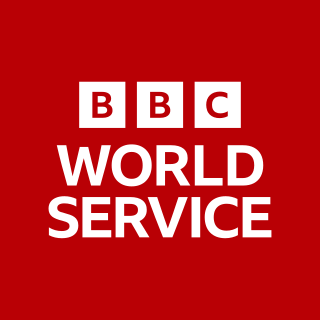Related Research Articles

Triple J is a government-funded, national Australian radio station founded in 1975 as a division of the Australian Broadcasting Corporation (ABC). It aims to appeal to young listeners of alternative music, and plays more Australian content than commercial networks.

The BBC World Service is an international broadcaster owned and operated by the BBC. It is the world's largest external broadcaster in terms of reception area, language selection and audience reach. It broadcasts radio news, speech and discussions in more than 40 languages to many parts of the world on analogue and digital shortwave platforms, internet streaming, podcasting, satellite, DAB, FM and MW relays. In 2024, the World Service reached an average of 450 million people a week. In November 2016, the BBC announced that it would start broadcasting in additional languages including Amharic and Igbo, in its biggest expansion since the 1940s.

Shortwave radio is radio transmission using radio frequencies in the shortwave bands (SW). There is no official definition of the band range, but it always includes all of the high frequency band (HF), which extends from 3 to 30 MHz ; above the medium frequency band (MF), to the bottom of the VHF band.

The Canadian Broadcasting Corporation, branded as CBC/Radio-Canada, is the Canadian public broadcaster for both radio and television. It is a Crown corporation that serves as the national public broadcaster, with its English-language and French-language service units known as CBC and Radio-Canada, respectively.
Public broadcasting involves radio, television, and other electronic media outlets whose primary mission is public service. Public broadcasters receive funding from diverse sources including license fees, individual contributions, public financing, and commercial financing, and claim to avoid both political interference and commercial influence.
The Greenwich Time Signal (GTS), popularly known as the pips, is a series of six short tones broadcast at one-second intervals by many BBC Radio stations to mark the precise start of each hour. The pips were introduced in 1924, generated by the Royal Observatory, Greenwich, and from 1990 were generated by the BBC in London. The broadcast pips replaced an electrical time coordination system based on the railway telegraph network, which itself was an extension of the mechanical time balls in Portsmouth (1829) and later Greenwich (1833), which enabled navigators aboard ships moored in those places to set their chronometers for the determination of longitude on voyages.
Canadian content refers to the Canadian Radio-television and Telecommunications Commission (CRTC) requirements, derived from the Broadcasting Act of Canada, that radio and television broadcasters must produce and broadcast a certain percentage of content that was at least partly written, produced, presented, or otherwise contributed to by persons from Canada. CanCon also refers to that content itself, and, more generally, to cultural and creative content that is Canadian in nature.

The Société de télédiffusion du Québec, branded as Télé-Québec, is a Canadian French-language public educational television network in the province of Quebec. It is a provincial Crown corporation owned by the Government of Quebec. The network's main studios and headquarters are located at the corner of de Lorimier Street and East René Lévesque Boulevard in Montreal.

It is generally recognized that the first radio transmission was made from a temporary station set up by Guglielmo Marconi in 1895 on the Isle of Wight. This followed on from pioneering work in the field by a number of people including Alessandro Volta, André-Marie Ampère, Georg Ohm, James Clerk Maxwell and Heinrich Rudolf Hertz.

France has one official language, the French language. The French government does not regulate the choice of language in publications by individuals, but the use of French is required by law in commercial and workplace communications. In addition to mandating the use of French in the territory of the Republic, the French government tries to promote French in the European Union and globally through institutions such as La Francophonie. The perceived threat from Anglicisation has prompted efforts to safeguard the position of the French language in France.

CKOI-FM is a commercial FM radio station in Montreal, Quebec, Canada. It airs a French-language CHR/Top 40 radio format and is owned and operated by Cogeco. The studios are in Place Bonaventure at 800 rue de la Gauchetière ouest in Montreal.
Television in Canada officially began with the sign-on of the nation's first television stations in Montreal and Toronto in 1952. As with most media in Canada, the television industry, and the television programming available in that country, are strongly influenced by media in the United States, perhaps to an extent not seen in any other major industrialized nation. As a result, the government institutes quotas for "Canadian content". Nonetheless, new content is often aimed at a broader North American audience, although the similarities may be less pronounced in the predominantly French-language province of Quebec.
CKMF-FM is a French-language Canadian radio station located in Montreal, Quebec, owned and operated by Bell Media. The station airs a mainstream rock format and is the flagship station of the "Énergie" network, which operates across Quebec. It offers personality DJs playing francophone and anglophone rock hits from the current charts to the 1980s.

CKGM is an English-language AM radio station in Montreal, Quebec, owned by Bell Media Radio. Formerly an affiliate of sports radio network "The Team," it was one of three stations to retain the sports format after the network folded in 2002 until it switched to the TSN Radio branding in October 2011. CKGM has been an all-sports station since May 2001. Its studios and offices are located on René Lévesque Boulevard East in Downtown Montreal.

89.9 TheLight is a Christian community radio station in Melbourne, Australia attracting more than a million listeners per month. It broadcasts on the FM band with the frequency of 89.9, on DAB+ digital radio and streams online via website and mobile app. Studios are located at 333 Mitcham Road, in Mitcham with FM transmitter on Mount Dandenong
A border blaster is a broadcast station that, though not licensed as an external service, is, in practice, used to target another country. The term "border blaster" is of North American origin, and usually associated with Mexican AM stations whose broadcast areas cover large parts of the United States, and United States border AM stations covering large parts of Canada. Conceptually similar European broadcasting included some pre-World War II broadcasting towards the United Kingdom, "radio périphérique" around France and the U.S. government-funded station Radio Free Europe, targeting European countries behind the Iron Curtain.
iHeartRadio is an American freemium broadcast, podcast and radio streaming platform owned by iHeartMedia. It was founded in August 2008 and iHeartRadio serves as the national umbrella brand for iHeartMedia's radio network, the largest radio broadcaster in the United States with 128 million registered users as of 2019 and its other consumer-facing brands. Its main radio competitors are Audacy, TuneIn and Sirius XM.
Sirius XM Canada Holdings Inc. is a Canadian broadcasting company which distributes the services of American satellite radio provider Sirius XM in Canada.
Music censorship refers to the practice of editing musical works for various reasons, stemming from a wide variety of motivations, including moral, political, or religious reasons. Censorship can range from the complete government-enforced legal prohibition of a musical work, to private, voluntary removal of content when a musical work appears in a certain context.

Community radio in Canada is a legally defined broadcasting category governed by the Canadian Radio-television and Telecommunications Commission (CRTC). It is distinct from the other two categories, commercial broadcasting, and public broadcasting. Community radio can be considered a subcategory of alternative media. Community radio exists worldwide and is often broadly similar around the world, however, it can have variations in the government regulations that they are required to follow, the national or regional contexts in which its developed and the specific culture, goals or methods they adhere to.
References
- ↑ "Commercial radio should play at least 25% Australian music, inquiry told". the Guardian. 3 April 2019. Retrieved 18 December 2021.
- ↑ "French radio goes to war with language quotas in fight for musical freedom". France 24. 28 September 2015. Retrieved 18 December 2021.
- ↑ "French rebel over music language quotas". BBC News. 3 October 2015. Retrieved 18 December 2021.
- ↑ Glotzmann, Thorsten. "The endless debate". Goethe-Institut. Retrieved 18 December 2021.
- ↑ Moore, Aoife (11 August 2020). "Communications minister rules out quota for Irish music on radio stations". Irish Examiner. Retrieved 18 December 2021.
- ↑ "NTC orders radio stations to play OPM". The Philippine Star. 20 August 2021. Retrieved 18 December 2021.